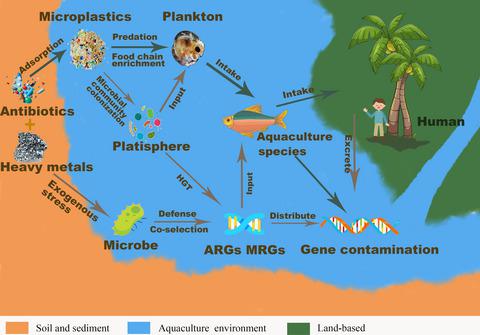当前位置:
X-MOL 学术
›
Rev. Aquacult.
›
论文详情
Our official English website, www.x-mol.net, welcomes your
feedback! (Note: you will need to create a separate account there.)
Interactions and associated resistance development mechanisms between microplastics, antibiotics and heavy metals in the aquaculture environment
Reviews in Aquaculture ( IF 8.8 ) Pub Date : 2021-11-22 , DOI: 10.1111/raq.12639 Zhen Li 1 , Muhammad Junaid 1 , Guanglong Chen 1 , Jun Wang 1, 2, 3
Reviews in Aquaculture ( IF 8.8 ) Pub Date : 2021-11-22 , DOI: 10.1111/raq.12639 Zhen Li 1 , Muhammad Junaid 1 , Guanglong Chen 1 , Jun Wang 1, 2, 3
Affiliation

|
Microplastics (MPs), antibiotics and heavy metals unavoidably contaminate the aquaculture environment, with serious ecological and human health consequences. Antibiotic-resistance genes (ARGs) and metal resistance genes (MRGs) are induced in microorganisms in the environment as a defence mechanism against antibiotics and heavy metals respectively. Furthermore, heavy metals in the aquaculture environment will cause bacteria to employ antibiotic resistance through co-selection (co-resistance or cross-resistance) and other potential mechanisms. MPs may also act as potential carriers of multidrug resistance in aquaculture environments because they are hotspots for the enrichment and transmission of antibiotic resistance. Multidrug-resistant (MDR) microorganisms in the aquaculture environment may infiltrate aquatic organisms via the food chain (eg MDR-microorganisms→myctophids→ tuna/ squid/ whales/ seabirds/ seals), and after long-term enrichment, they may gain access to the human body, posing a major risk to aquaculture and human health. As a result, this review article summarises contamination of MPs, heavy metal and antibiotics in global aquaculture settings; discusses the generation of ARGs, MRGs and common selection mechanisms for resistance development and emphasises the role of MPs as hot spots for antibiotic-resistance selective enrichment, as well as potential carriers of multi-drug-resistant genes (MDRGs), in the aquaculture environment, posing an increasing threat to aquaculture and even human health.
中文翻译:

水产养殖环境中微塑料、抗生素和重金属之间的相互作用和相关耐药性发展机制
微塑料 (MPs)、抗生素和重金属不可避免地污染水产养殖环境,对生态和人类健康造成严重后果。抗生素抗性基因 (ARGs) 和金属抗性基因 (MRGs) 在环境中的微生物中被诱导,分别作为对抗生素和重金属的防御机制。此外,水产养殖环境中的重金属会通过共同选择(共同抗性或交叉抗性)和其他潜在机制导致细菌对抗生素产生耐药性。MPs 也可能成为水产养殖环境中多重耐药性的潜在载体,因为它们是抗生素耐药性富集和传播的热点。水产养殖环境中的耐多药(MDR)微生物可能通过食物链渗入水生生物(如耐多药微生物→真菌→金枪鱼/鱿鱼/鲸鱼/海鸟/海豹),经过长期富集后,可能会进入人体,对水产养殖和人类健康构成重大风险。因此,这篇综述文章总结了全球水产养殖环境中 MPs、重金属和抗生素的污染;讨论 ARGs、MRGs 的产生和耐药性发展的常见选择机制,并强调 MPs 在水产养殖环境中作为抗生素耐药性选择性富集热点的作用,以及多重耐药基因 (MDRGs) 的潜在载体,对水产养殖甚至人类健康构成越来越大的威胁。
更新日期:2021-11-22
中文翻译:

水产养殖环境中微塑料、抗生素和重金属之间的相互作用和相关耐药性发展机制
微塑料 (MPs)、抗生素和重金属不可避免地污染水产养殖环境,对生态和人类健康造成严重后果。抗生素抗性基因 (ARGs) 和金属抗性基因 (MRGs) 在环境中的微生物中被诱导,分别作为对抗生素和重金属的防御机制。此外,水产养殖环境中的重金属会通过共同选择(共同抗性或交叉抗性)和其他潜在机制导致细菌对抗生素产生耐药性。MPs 也可能成为水产养殖环境中多重耐药性的潜在载体,因为它们是抗生素耐药性富集和传播的热点。水产养殖环境中的耐多药(MDR)微生物可能通过食物链渗入水生生物(如耐多药微生物→真菌→金枪鱼/鱿鱼/鲸鱼/海鸟/海豹),经过长期富集后,可能会进入人体,对水产养殖和人类健康构成重大风险。因此,这篇综述文章总结了全球水产养殖环境中 MPs、重金属和抗生素的污染;讨论 ARGs、MRGs 的产生和耐药性发展的常见选择机制,并强调 MPs 在水产养殖环境中作为抗生素耐药性选择性富集热点的作用,以及多重耐药基因 (MDRGs) 的潜在载体,对水产养殖甚至人类健康构成越来越大的威胁。











































 京公网安备 11010802027423号
京公网安备 11010802027423号